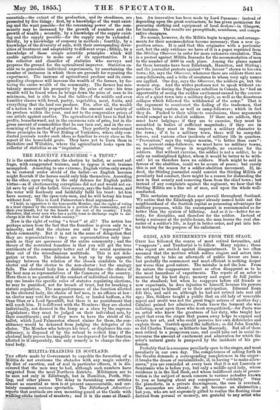MILITIA-TRAINING IN SCOTLAND.
TEE efforts made by Government to expedite the formation of a Militia do not overcome the obstacles with any magic celerity. By dint of exertion, and of zeal in particular officers, it is dis- covered that the men may be had, although such numbers have emigrated from the most Northern districts. Militiamen are to be seen not only in Edinburgh, but in Hamilton, Perth, Stir- ling, and other places. The delay in furnishing some articles almost as essential as men is at present unaccountable, and cer- tainly occasions curious spectacles. The Edinburgh Advertiser reports that sentinels are seen mounting guard at the Castle with walking-sticks instead of muskets ; and it is the same at Hamil-
ton. Au innovation has been made by Lord Paumure: instead of depending upon the great contractors, he has given permission for procuring clothing and equipment of local dealers—in Glasgow, for instance. The results are promptitude, soundness, and compa- rative cheapness.
No sooner, however, do the Militia begin to appear, and arrange. ments for their accommodation become necessary, than a new op- position arises. It is said that this originates with a particular sect, but the only evidence we have of it is a paper reprinted from the .Stirling Observer in order for more extensive circulation. This is a protest against Militia Barracks for the accommodation of men to the number of 5000 in each place. Among the places named for these barracks have been Edinburgh, Hamilton, and Stirling ; and the journalist protests against " the favour" shown to his own town; for, says the Observer, wherever there are soldiers there are camp-followers, and a tribe of creatures to whom very ugly names are applied. One day, says the Observer, the soldiers go, but the women stop. And the writer professes not to speak without ex- perience; for daring the Papineau rebellion in Canada, he "had an opportunity of seeing the sudden excitement caused by the conver- sion of a quiet town into a military depM, as well as the disastrous collapse which followed the withdrawal of the army." That is the argument to counteract the feeling of the tradesmen, that soldiers bring custom as well as camp-followers ; which in fact they do. Pushed to their ultimate conclusions, these arguments would compel us to abolish soldiers. If there are soldiers, they must have lodgings ; if they are to exercise, they 'must be assembled in bodies of sufficient magnitude; if they are in numbers, they must in time impart a military character to the town ; if it be a military town, thera will be camp-fol- lowers, and various other incidents of military life in quarters. "Prevention," says the vulgar maxim, "is better than cure": so, to prevent camp-followers, we must have no military towns, no assembling of troops in magnitude, no exercise for the soldiers. But without exercise, the soldier is not a soldier, he is only an undisciplined fighter, whom it would be better to be with- out : let us therefore have no soldiers. Much might be said in favour of the abolition, could we be secure of peace; but surely this is not the season for a soldier-abolition movement. If, in- deed, the Stirling journalist could convict the Stirling Militia of peculiarly bad conduct, there might be a reason for disbanding the men in that county and removing them from the chief town ' • but instead of any complaints against the regiment, we hear that the Stirling Militia are a fine set of men, and upon the whole well- conducted.
This sectarian morality does not prevail throughout Scotland. We notice that the Edinburgh paper already named holds out the neighbourhood of the Scottish capital as possessing advantages for military purposes,. while the encampment is recommended as far better than the system of billeting. And so it is—better for so- ciety, for discipline, and therefore for the soldier. Instead of being a nuisance at the public-house, the man learns the real cha- racter of a soldier's life, is kept in better order, and put into bet- ter training for the purpose of his enlistment.


































 Previous page
Previous page